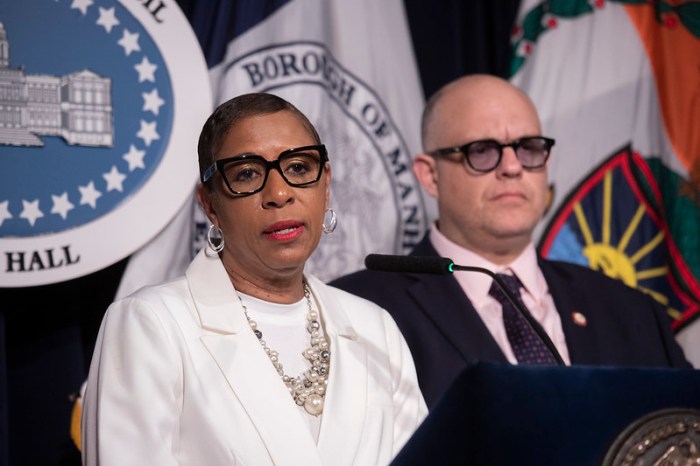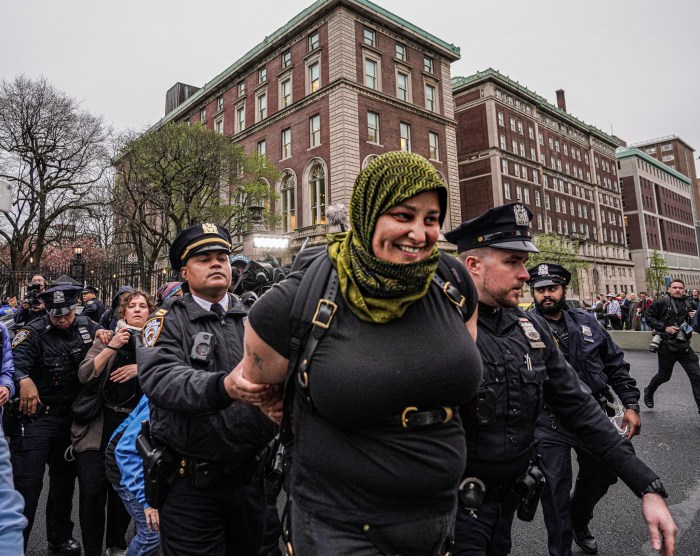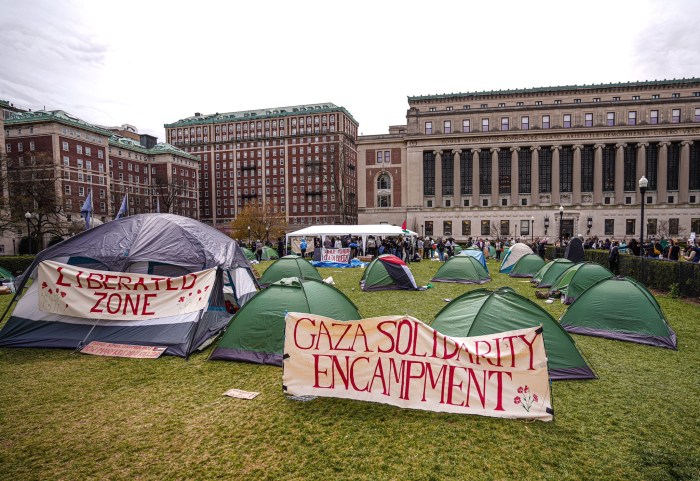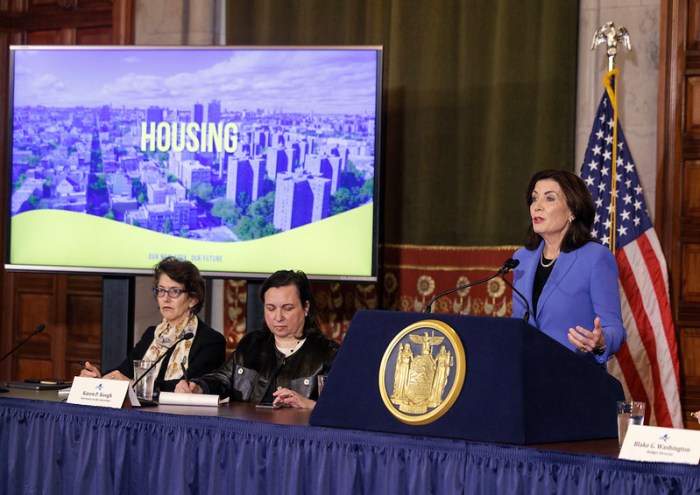President Donald Trump delivered his first State of the Union address Tuesday night, pushing for unity amid a year of turbulent politics in America and detailing future plans on key policy issues, including immigration reform.
The president opened his speech, which began shortly after 9 p.m., by reflecting on the “very swift action” his administration took in the first days of his presidency, roughly one year ago.
“Over the last year we’ve made incredible progress and achieved extraordinary success,” Trump said. “Let’s begin tonight by recognizing that the state of our union is strong because our people are strong. And together we are building a safe, strong and proud America.”
During the speech, which lasted about an hour and 20 minutes, Trump highlighted the recent tax overhaul passed by Congress and delved deeper into plans for immigration reform — a contentious issue facing the nation since the end of the Deferred Action for Arrivals program was announced in September.
New York Rep. Yvette Clarke brought NYC-based immigrant rights activist Ravi Ragbir — whose detainment by ICE earlier in January touched off heated protests in the city — to the State of the Union as her guest. New York Rep. Nydia Velázquez brought Ragbir’s wife, Amy Gottlieb.
Scroll down for highlights from Trump’s State of the Union address.
Push for unity
“Tonight, I call upon all of us to set aside our differences, to seek out common ground, and to summon the unity we need to deliver for the people we were elected to serve,” the president said.
But while Trump called for bipartisanship, the deep divide between the parties was evident as he spoke. Republican lawmakers cheered wildly at the president’s applause lines, while Democrats often sat in their seats silently.
Economic growth
Trump touted a 2.4 million spike in job growth over the past year, including 200,000 new jobs in the manufacturing sector.
“After years and years of wage stagnation we are finally seeing rising wages,” he added before moving on to unemployment rates, which he said have hit a 45-year low. “Something I’m very proud of: African American unemployment stands at the lowest rate ever recorded.”
Small business confidence is through the roof, Trump said, and the stock market has “smashed one record after another.”
Tax reform
“We enacted the biggest tax cuts and reforms in American history,” Trump said of the tax overhaul bill passed by Congress in December.
The tax plan provides “tremendous relief” for the middle class and small businesses, he said, and nearly doubles the standard deduction for everyone.
“This April will be the last time you ever file under the old and very broken system and millions of Americans will have more take-home pay starting next month, a lot more,” Trump said.
The president also highlighted improvements in the business sector that he attributed to the tax overhaul plan, including Apple’s announcement earlier in January that it would invest $350 billion into the U.S. economy and add 20,000 new jobs over the next five years.
Immigration reform
The president outlined a four-pillar plan for immigration reform, “one where no one gets everything they want, but one where our country gets the critical reforms it needs.”
1. The first pillar would “generously” offer a path to citizenship for 1.8 million illegal immigrants who were brought to the U.S. as children, also known as Dreamers. “That covers almost three times more people than the previous administration,” Trump said. Applicants who meet certain education and work standards would be eligible to become citizens over a 10- to 12-year period.
2. The second pillar focuses on securing the country’s borders. Building a wall along Mexico’s border and hiring more Immigration and Customs Enforcement and Border Patrol agents will “keep our communities safe,” Trump said.
3. The third pillar would end the visa lottery system, which Trump described as “a program that randomly hands out green cards without any regard for skill, merit, or the safety of our people,” in favor of a merit-based system.
4. “The fourth and final pillar protects the nuclear family by ending chain migration,” Trump said. The plan would focus on only allowing immigrants in the U.S. to sponsor minor children and spouses – a proposal that drew boos from several people in the audience.
These four pillars represent a “down-the-middle” compromise, Trump concluded.
Infrastructure
“As we rebuild our industries it’s also time to rebuild our crumbling infrastructure,” Trump said.
The president urged Congress to come together to deliver “the safe, fast, reliable, and modern infrastructure our economy needs and our people deserve.” Lawmakers can achieve this, he said, by passing legislation that generates $1.5 trillion through a combination of federal, state and local spending as well as private-sector contributions.
Building America’s nuclear arsenal
Citing “rogue regimes, terrorist groups and rivals like China and Russia,” Trump asked Congress to end the defense sequester and “fully fund our great military.”
“As part of our defense, we must modernize and rebuild our nuclear arsenal, hopefully never having to use it, but making it so strong and powerful that it will deter any acts of aggression,” the president added. “Perhaps someday in the future there will be a magical moment when the countries of the world will get together to eliminate their nuclear weapons. Unfortunately, we are not there yet.”
North Korea
Branding North Korea’s leadership “depraved,” Trump said Pyongyang’s pursuit of nuclear missiles could “very soon threaten our homeland” and vowed a continued campaign of maximum pressure to keep that from happening.
The president vowed to not repeat the mistakes of past administrations. “Past experience has taught us that complacency and concessions only invite aggression and provocation,” he said.
Executive order to keep Guantanamo detention center open
Trump said he has signed an executive order to keep the military detention center at Guantanamo Bay, Cuba, open. “I just signed, prior to walking in, an order directing (Defense) Secretary (Jim) Mattis … to re-examine our military detention policy and to keep open the detention facilities in Guantanamo Bay,”
Former President Barack Obama unsuccessfully tried to close the detention center during his time in office.
The story of Kayla Cuevas and Nisa Mickens
In attendance at the State of the Union were the parents of two Long Island teenagers who were murdered in September 2016. Six members of the MS-13 street gang have been charged in the girls’ deaths, Trump said.
“Many of these gang members took advantage of glaring loopholes in our laws to enter the country as unaccompanied alien minors ‑- and wound up in Kayla and Nisa’s high school,” the president said before calling on Congress to close the loopholes. “Evelyn, Elizabeth, Freddy, and Robert: Tonight, everyone in this chamber is praying for you. Everyone in America is grieving for you. And 320 million hearts are breaking for you. We cannot imagine the depth of your sorrow, but we can make sure that other families never have to endure this pain.”
Ending the ‘war on American Energy’
Over the past year, Trump said his administration has ended the “war on clean coal,” and the country has now become “an exporter of energy to the world.”
In Detroit, I halted government mandates that crippled America’s autoworkers – so we can get the Motor City revving its engines once again,” he said before touting several car companies that are building and expanding manufacturing in the U.S.
‘Right to try’
Trump said he wants lawmakers to support the “right to try” for terminally ill patients to try experimental therapies not approved by federal authorities.
“It is time for the Congress to give these wonderful Americans the ‘right to try,’ ” Trump said.
Similar legislation was approved by the Senate in August by a vote of 94-1. It was designed to give terminally ill patients access to unapproved medications and to provide immunity for physicians willing to administer the treatments.
Trade
“The era of economic surrender is over. From now on, we expect trading relationships to be fair and to be reciprocal. We will work to fix bad trade deals and negotiate new ones,” Trump said. “And we will protect American workers and American intellectual property, through strong enforcement of our trade rules.”
Not-so-veiled jab at the NFL kneeling protest
Trump singled out a speech guest, 12-year-old Preston Sharp, for leading an effort to put American flags on the graves of 40,000 veterans, saying the initiative was “why we proudly stand for the national anthem.”
Trump has been feuding with the NFL over the decision by some of its players to kneel during the national anthem as a sign of peaceful protest over police brutality against black Americans.
With Reuters

















